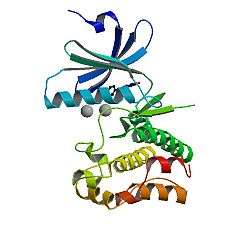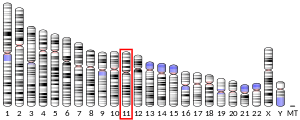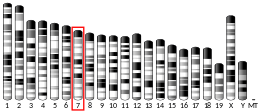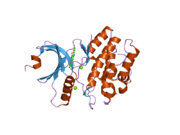Wee1-like protein kinase
WEE1 homolog (S. pombe), also known as WEE1, is a protein which in humans is encoded by the WEE1 gene.[5]
Function
This gene encodes a nuclear protein, which is a tyrosine kinase belonging to the Ser/Thr family of protein kinases. This protein catalyzes the inhibitory tyrosine phosphorylation of CDC2/cyclin B kinase, and appears to coordinate the transition between DNA replication and mitosis by protecting the nucleus from cytoplasmically activated CDC2 kinase.[6]
Interactions
Wee1-like protein kinase has been shown to interact with YWHAB[7] and PIN1.[8]
gollark: People will just do it for bad reasons.
gollark: That seems bad.
gollark: Just have anyone arbitrarily able to say "I'm exempt"?
gollark: So how *do* you make it work?
gollark: Not a fair comparison.
References
- GRCh38: Ensembl release 89: ENSG00000166483 - Ensembl, May 2017
- GRCm38: Ensembl release 89: ENSMUSG00000031016 - Ensembl, May 2017
- "Human PubMed Reference:". National Center for Biotechnology Information, U.S. National Library of Medicine.
- "Mouse PubMed Reference:". National Center for Biotechnology Information, U.S. National Library of Medicine.
- Igarashi M, Nagata A, Jinno S, Suto K, Okayama H (September 1991). "Wee1(+)-like gene in human cells". Nature. 353 (6339): 80–3. Bibcode:1991Natur.353...80I. doi:10.1038/353080a0. PMID 1840647.
- "Entrez Gene: WEE1 WEE1 homolog (S. pombe)".
- Wang, Y; Jacobs C; Hook K E; Duan H; Booher R N; Sun Y (April 2000). "Binding of 14-3-3beta to the carboxyl terminus of Wee1 increases Wee1 stability, kinase activity, and G2-M cell population". Cell Growth Differ. UNITED STATES. 11 (4): 211–9. ISSN 1044-9523. PMID 10775038.
- Shen, M; Stukenberg P T; Kirschner M W; Lu K P (March 1998). "The essential mitotic peptidyl-prolyl isomerase Pin1 binds and regulates mitosis-specific phosphoproteins". Genes Dev. UNITED STATES. 12 (5): 706–20. doi:10.1101/gad.12.5.706. ISSN 0890-9369. PMC 316589. PMID 9499405.
Further reading
- Kino T, Pavlakis GN (2004). "Partner molecules of accessory protein Vpr of the human immunodeficiency virus type 1". DNA Cell Biol. 23 (4): 193–205. doi:10.1089/104454904773819789. PMID 15142377.
- Kino T, Chrousos GP (2004). "Human immunodeficiency virus type-1 accessory protein Vpr: a causative agent of the AIDS-related insulin resistance/lipodystrophy syndrome?". Ann. N. Y. Acad. Sci. 1024 (1): 153–67. Bibcode:2004NYASA1024..153K. doi:10.1196/annals.1321.013. PMID 15265780.
- Le Rouzic E, Benichou S (2006). "The Vpr protein from HIV-1: distinct roles along the viral life cycle". Retrovirology. 2: 11. doi:10.1186/1742-4690-2-11. PMC 554975. PMID 15725353.
- Zhao RY, Elder RT (2005). "Viral infections and cell cycle G2/M regulation". Cell Res. 15 (3): 143–9. doi:10.1038/sj.cr.7290279. PMID 15780175.
- Zhao RY, Bukrinsky M, Elder RT (2005). "HIV-1 viral protein R (Vpr) & host cellular responses". Indian J. Med. Res. 121 (4): 270–86. PMID 15817944.
- Li L, Li HS, Pauza CD, et al. (2006). "Roles of HIV-1 auxiliary proteins in viral pathogenesis and host-pathogen interactions". Cell Res. 15 (11–12): 923–34. doi:10.1038/sj.cr.7290370. PMID 16354571.
- Igarashi M, Nagata A, Jinno S, et al. (1991). "Wee1(+)-like gene in human cells". Nature. 353 (6339): 80–3. Bibcode:1991Natur.353...80I. doi:10.1038/353080a0. PMID 1840647.
- Baldin V, Ducommun B (1995). "Subcellular localisation of human wee1 kinase is regulated during the cell cycle". J. Cell Sci. 108 (6): 2425–32. PMID 7673359.
- Watanabe N, Broome M, Hunter T (1995). "Regulation of the human WEE1Hu CDK tyrosine 15-kinase during the cell cycle". EMBO J. 14 (9): 1878–91. doi:10.1002/j.1460-2075.1995.tb07180.x. PMC 398287. PMID 7743995.
- McGowan CH, Russell P (1995). "Cell cycle regulation of human WEE1". EMBO J. 14 (10): 2166–75. doi:10.1002/j.1460-2075.1995.tb07210.x. PMC 398322. PMID 7774574.
- Kharbanda S, Yuan ZM, Taneja N, et al. (1994). "p56/p53lyn tyrosine kinase activation in mammalian cells treated with mitomycin C.". Oncogene. 9 (10): 3005–11. PMID 8084605.
- Heald R, McLoughlin M, McKeon F (1993). "Human wee1 maintains mitotic timing by protecting the nucleus from cytoplasmically activated Cdc2 kinase". Cell. 74 (3): 463–74. doi:10.1016/0092-8674(93)80048-J. PMID 8348613.
- McGowan CH, Russell P (1993). "Human Wee1 kinase inhibits cell division by phosphorylating p34cdc2 exclusively on Tyr15". EMBO J. 12 (1): 75–85. doi:10.1002/j.1460-2075.1993.tb05633.x. PMC 413177. PMID 8428596.
- Taviaux SA, Demaille JG (1993). "Localization of human cell cycle regulatory genes CDC25C to 5q31 and WEE1 to 11p15.3-11p15.1 by fluorescence in situ hybridization". Genomics. 15 (1): 194–6. doi:10.1006/geno.1993.1032. PMID 8432534.
- Booher RN, Holman PS, Fattaey A (1997). "Human Myt1 is a cell cycle-regulated kinase that inhibits Cdc2 but not Cdk2 activity". J. Biol. Chem. 272 (35): 22300–6. doi:10.1074/jbc.272.35.22300. PMID 9268380.
- Zhou BB, Li H, Yuan J, Kirschner MW (1998). "Caspase-dependent activation of cyclin-dependent kinases during Fas-induced apoptosis in Jurkat cells". Proc. Natl. Acad. Sci. U.S.A. 95 (12): 6785–90. Bibcode:1998PNAS...95.6785Z. doi:10.1073/pnas.95.12.6785. PMC 22635. PMID 9618490.
- Taylor WR, DePrimo SE, Agarwal A, et al. (1999). "Mechanisms of G2 arrest in response to overexpression of p53". Mol. Biol. Cell. 10 (11): 3607–22. doi:10.1091/mbc.10.11.3607. PMC 25646. PMID 10564259.
- Wang Y, Jacobs C, Hook KE, et al. (2000). "Binding of 14-3-3beta to the carboxyl terminus of Wee1 increases Wee1 stability, kinase activity, and G2-M cell population". Cell Growth Differ. 11 (4): 211–9. PMID 10775038.
- Cichutek A, Brueckmann T, Seipel B, et al. (2001). "Comparative architectural aspects of regions of conserved synteny on human chromosome 11p15.3 and mouse chromosome 7 (including genes WEE1 and LMO1)". Cytogenet. Cell Genet. 93 (3–4): 277–83. doi:10.1159/000056998. PMID 11528126.
- Elder RT, Yu M, Chen M, et al. (2001). "HIV-1 Vpr induces cell cycle G2 arrest in fission yeast (Schizosaccharomyces pombe) through a pathway involving regulatory and catalytic subunits of PP2A and acting on both Wee1 and Cdc25". Virology. 287 (2): 359–70. doi:10.1006/viro.2001.1007. PMID 11531413.
External links
- WEE1+protein,+human at the US National Library of Medicine Medical Subject Headings (MeSH)
This article is issued from Wikipedia. The text is licensed under Creative Commons - Attribution - Sharealike. Additional terms may apply for the media files.





